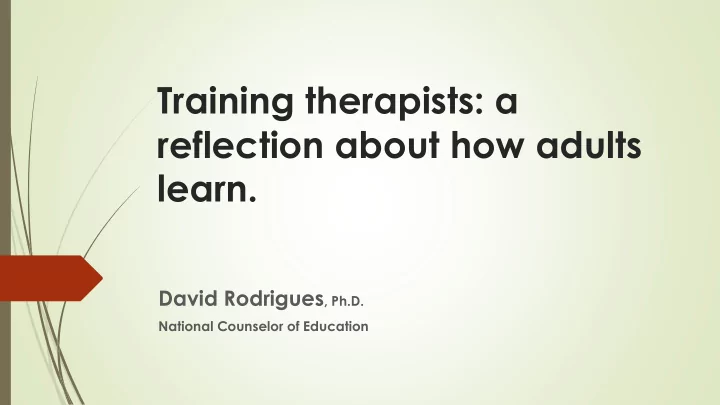

Training therapists: a reflection about how adults learn. David Rodrigues , Ph.D. National Counselor of Education
Challanges of OT in Portugal Portugal: 98% of students with disabilities are educated in regular schools Resource Centers for Inclusion (RCI) – 90 in the country. Support provided in the school.
Challanges of OT in Portugal OT as an intervention with other professionals Exchange of information, sharing competencies (with teachers, with psychomotor therapists, with families, etc.) Understand the scope of other interventions and providing knowledge of the specific domain on intervention aiming Education and Learning
But … How can Professional Education deal with these challenges? Which would be the best strategies to educate Occupational Therapists to work in a dinamic and team based environment?
Let’s see…… Old Donkey learns languages?
Starting points is adult learning different from children? Different in what? (ex: maturity, responsibility, relational, motivation,...) The mission of training is for all trainees to obtain the necessary skills. The learners have changed (resources, strategies, motivation) and, so, to teach everyone and well, must change too.
Starting points Learning is not a simple copy or transmission. It's not a simple "stable change of behaviour" Learning is the transition from one paradigm to another: it is a change between different representations of a reality: between what you knew bef o re and what you will know later.
Starting points We need learning models that are suitable for all students. Models that allow different learning profiles to be accommodated. If there are "different learning styles" There have to be different "teaching styles". Although there are common traits that facilitate learning, there is a large variability in the modalities, in the environments, in the media, in the times when each of us learns . ("How do I learn?")
Starting points "There's a big difference between who has ten years of experience and who has ten times the first year of experience." It is not the experience, nor the error, nor the memory that makes us learn, we learn by reflection, by the awareness of the difference, by the " work to think about the work "
Some reflections … about adult learning
Learning planning for All (Universal Learning Design) Provide multiple learning opportunities Provide multiple means of representation Provide multiple means of action and expression
1. Commitment/motivation for learning 1.1. Who are our graduates? Notion of neuroplasticity (the brain shaped by experience) 1.2. Importance of mobilizing emotions and feelings (A. Damásio "The error of Descartes“, 1999)
2. Representation 2.1. Use different modalities to represent knowledge and learning (cognitive maps, graphs, dramatization, improbable dialogues, mnemonics, etc.) 2.2. Audio-visual, multimodal learning. 2.3. Present our knowledge to others.
3. Action and expression 3.1. The role of imitation and observation (ref. mirror- neurons) 3.2. Theory-Practice/reflection 3.3. Appeal to DT (e.g. Twiter, presentations,...)
Improving training 1. Predictability, repetition and routine are brain sleepers; On the contrary, the forecast, the innovation and the surprise are alarm clocks... 2. "Who only knows medicine, not even knows medicine" (Abel Salazar). Cross-referencing teaching with other areas facilitates learning.
Improving training 3. To know and respect the starting point of students ("You cannot teach anything to those who know nothing") 4. Stimulating group and team work (sufficiently complex and extensive issues to be resolved by several people...) (Knowing other routes reinforces the effectiveness of our own course)
Improving training 5. Do not consider the motivation as "taken for granted". Make the learning process a journey, a change, a promotion. 6. To hold the graduates responsible for their learning process. Value their ability to learn. Develop metacognition ("Learning to Learn").
Improving training 7. Create a Learning support organization (individual with additional means, with tutoring, with new experiential areas, with personalized support by the Formator) "It is not about transforming knowledge into practice but of transforming training practices into professional knowledge" (Schulman, 2004)
Closing... I learn. And Iwalk in the plain sand, I follow your footsteps But my step is different. I’ll walk on your side But how long are we going to be mates? (DR, The Day Strainer , 2012)
Finnally … Old Dunkeys learn languages!
Recommend
More recommend